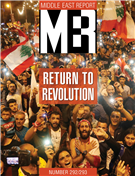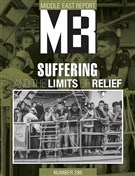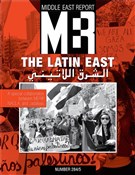PULL OF THE POSSIBLE
Are the upheavals in the Arab world revolutions? Uprisings? Perhaps all such terms are misnomers, in that they imply an end point to processes that may not have a terminus. Regimes may fall or stand; movements may sputter or succeed in establishing a more democratic system. It often seems as if there are two parallel universes, one of revolution and one of retrenchment, which periodically collide with varying degrees of violence. The key, as argued in the spring 2012 issue of Middle East Report, “Pull of the Possible,” is that the status quo ante cannot be restored.
John Chalcraft searches through critical social theory to understand the “horizontalism” at the cutting edge of Egyptian activism. The activists’ participatory, “leaderful” practices, themselves a rejection of old political habits, may yet produce an alternative vision for Egyptian society. Shana Marshall and Joshua Stacher detail the simultaneous labors of Egypt’s ruling generals to forge a vertical economic order even more lucrative for themselves.
In Tunisia, as Rikke Hostrup Haugbolle and Francesco Cavatorta contend, the rise of Ennahda is rooted in social forces that grew stronger under the radar of Ben Ali’s secret police -- pious middle classes that benefited somewhat from neoliberal economic policies but detested the dictatorship on ethical grounds. In their charitable and educational activities, they simply want to be left alone by the state.
Today the clash of futures is bloodiest in Syria, in part reflecting the geopolitical agendas at stake. Bassam Haddad traces the historical formation of the Syrian regime’s “business backbone.” Curtis Ryan references classic texts by Malcolm Kerr and Patrick Seale to locate the contemporary struggle for Syria in the milieu of a new Arab cold war.
Also featured: Roschanack Shaery documents ongoing efforts to find Lebanese who “disappeared” into Syrian hands; Amélie Barras recounts a key battle over the headscarf in Turkey; Mimi Kirk tracks how Washington came, in practice, to back South Sudanese secession; Max Ajl reviews Shir Hever’s The Political Economy of Israel’s Occupation; and more.
Subscribe to Middle East Report or order individual copies here.
For further information, contact Chris Toensing at ctoensing@merip.org.
Middle East Report is published by the Middle East Research and Information Project (MERIP), a progressive, independent organization based in Washington, DC. Since 1971 MERIP has provided critical analysis of the Middle East, focusing on political economy, popular struggles and the implications of US and international policy for the region.
![[Merip cover]](https://kms.jadaliyya.com/Images/357x383xo/meripcover.jpg)










